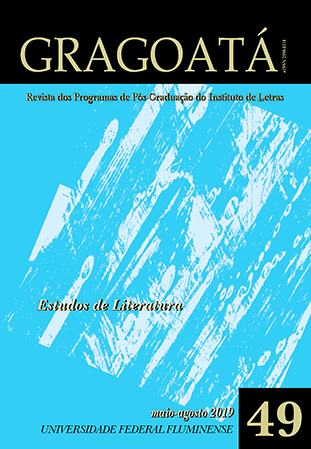Epistemologia do traduzir: normas de uso e sua descrição 'a parte post'
DOI:
https://doi.org/10.22409/gragoata.v24i49.34106Palabras clave:
Teoria da Tradução, Gideon Toury, Wittgenstein.Resumen
Discutem-se aqui traços fundamentais das condições de possibilidade para ato tradutório, como reflexão teórica de cunho pragmático e perspectivista, entre o essencialismo da tradição e o relativismo pós-moderno. Tais aspectos remetem a uma epistemologia do traduzir tributária, dentre outros, da epistemologia do uso desenvolvida por Arley Moreno a partir da terapia conceitual de Ludwig Wittgenstein e da noção de estilo de Gilles Gaston Granger. A discussão parte do conceito de normas tradutórias de Gideon Toury e duas críticas que lhe foram dirigidas, sob diferentes perspectivas: (1) sociologia da tradução; (2) desconstrução. Pano de fundo argumentativo é o entendimento de que a abordagem de Toury é plenamente compatível com a concepção de linguagem do Wittgenstein tardio, não somente na aplicação da noção wittgensteiniana de semelhanças de família ao campo da tradução, mas também na forma como mobiliza o conceito de norma subjacente ao uso que se quer descrever. Defende-se que as normas tradutórias no sentido de Toury explicitam o caráter a parte post que Granger atribui aos fenômenos do estilo e que Moreno investiga na função transcendental da linguagem. Por fim, sugere-se que os polos adequação vs. aceitabilidade na proposta de Toury revelam dois momentos lógicos no processo tradutório: analogia inicial (entre o que é diferente) e acomodação digital na chegada.
Descargas
##submission.downloads##
Publicado
Cómo citar
Número
Sección
Licencia
AUTORIZAÇÃO
Autores que publicam em Gragoatá concordam com os seguintes termos:
Os autores mantêm os direitos e cedem à revista o direito à primeira publicação, simultaneamente submetido a uma licença Creative Commons Atribuição 4.0 Internacional (CC BY 4.0), que permite o compartilhamento por terceiros com a devida menção ao autor e à primeira publicação pela Gragoatá.
Os autores podem entrar em acordos contratuais adicionais e separados para a distribuição não exclusiva da versão publicada da obra (por exemplo, postá-la em um repositório institucional ou publicá-la em um livro), com o reconhecimento de sua publicação inicial na Gragoatá.
A Gragoatá utiliza uma Licença Creative Commons - Atribuição CC BY 4.0 Internacional.














